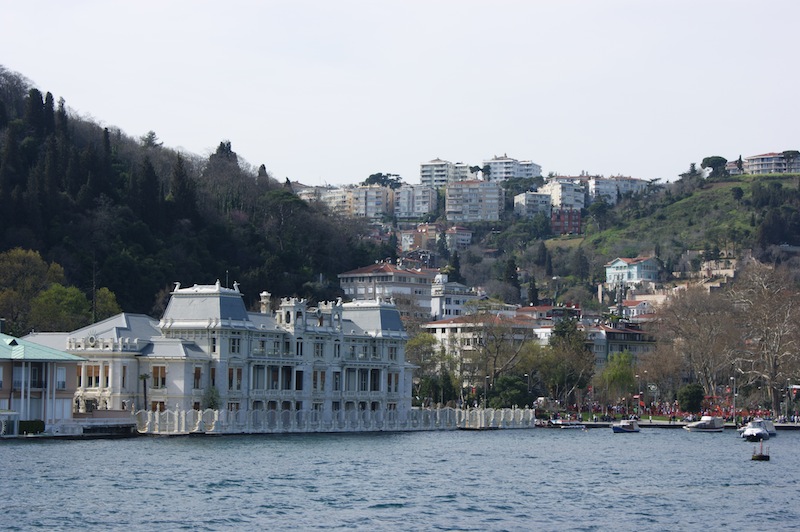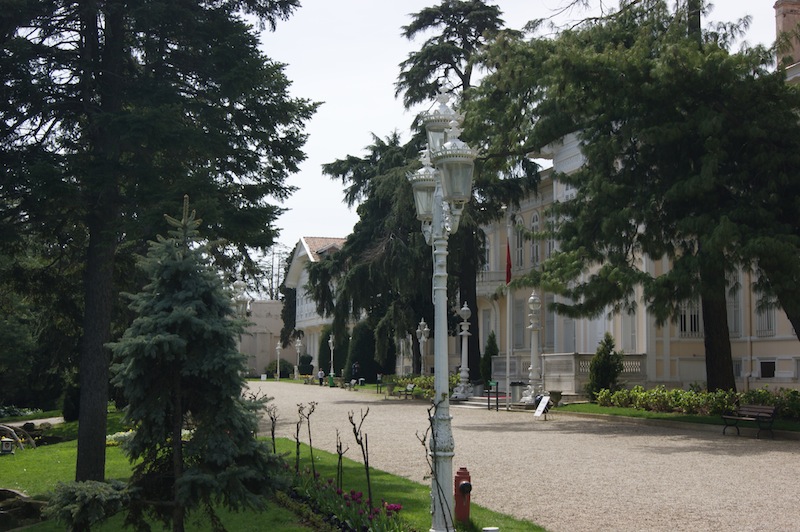Istanbul is a city of Imperial Ottoman splendour with its fair share of handsome mansions, among them the waterfront Dolmabahce Palace.
But when we arrived for a visit on the tram at nearby Kabatas, disappointment lurked in the form of a long, long and slow-moving queue at the palace ticket office. Pained by sunburn and in a filthy mood, I couldn’t bear the thought of waiting in line so changed tack and instead suggested we grab a cab to the nearby district of Ortakoi.

By the time we got there, I’d calmed down a bit and we wandered around the district’s thriving Sunday handicraft market, away from the busy road that ploughed unattractively and noisily through this old working class area. Popular with locals and families, the market was busy but there wasn’t a huge amount to tempt me into parting with my cash. Jewellery, lace, food and clothes dominated.
Sadly, the allegedly delightful mosque that our Lonely Planet book raved about was shrouded in scaffolding and tarpaulin so we didn’t get to see that either. But nothing could block the amazing views of the nearby if rather overwhelming Bosphorus Bridge from the water’s edge.
Asia was just across the water, hazy in the mid-morning sunshine. Little boats, ferries and giant merchant vessels chugged this way and that while around us, couples and families, old and young, tucked into ice cream, chatted and shopped.

We took a break from the crowds and walked up into Yildiz Park, a steep climb in the humidity but with some beautifully laid-out and colourful tulip beds amid the shade. The park was busy too, with families enjoying picnics, brides and grooms having their photos taken and vexing traffic, drivers impatiently sitting on their horns as they wound their way along the narrow roads.
The park also houses an imperial porcelain factory and a magnificent pavilion with extravagant chandeliers that’s now a busy restaurant. But its crowning glory is the Yildiz Palace, an imperial hunting lodge/palace/guest house at the top of the park, built by the Sultans in the 19th century and with great views of the Bosphorus below.

This mainly wooden building was often used by foreign guests of the state, including Kaiser Wilhelm and Churchill, and was clearly influenced by French and Italian styles. In fact, inside it looked more like a traditional European royal palace than an Ottoman one.
We joined a small group for a tour led by a knowledgable guide, a tour that concluded in a an exuberant ballroom that supposedly houses the largest carpet in the world. Outside, in the compact grounds, we enjoyed the peace and quiet before descending back down through the park to the bustling Ortakoi waterfront.
We lunched in Iskele Square and then opted for a boat trip, sailing north up the Bosphorus with plenty of locals for company. As we boarded the vessel at the quay, I noticed that the water was full of what looked like zillions of dead jellyfish and, sadly, litter by the ton.

This was clearly a popular Sunday excursion with locals, who enjoyed the dodgy Turkish music straining through the ship’s speakers rather more than I did. We sailed past the city’s suburbs, many of which looked wealthy and surprisingly attractive, the buildings tumbling down green hills to waterfronts busy with visitors. We spotted mansions and yachts moored on the water, watched giant cargo vessels passing by and appreciated the views of Rumelihisari – an historic fortress with forbidding walls and towers.
On the eastern, Asian side of the water, there were more posh suburbs and some beautiful waterfront mansions and palaces, including one that posed as Elektra King’s fabulous Baku home in the James Bond film The World is Not Enough.

Back on dry land, feeling a little windswept, we tried to get home by bus and tram. But the narrow road from Ortakoi back to the heart of Istanbul was rammed with traffic and we spent most of the journey crawling along at less than a walking pace.
The bus was sweltering and dusty, truly unpleasant, and I began to have fantasies involving ice-cold lager. Istanbul really is a city that has a serious problem with traffic, which deadens the soul and fills the nostrils with pollution.
Free at last of it, we adjourned to the glamour of the Four Seasons in Sultanhamet. It may have been a prison in a previous life but it really is one of the city’s best hotels – and it served ice cold beer.

